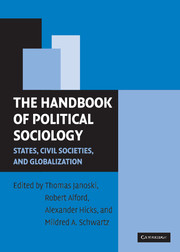Book contents
- Frontmatter
- Contents
- Preface
- Contributors
- Political Sociology in the New Millenium
- PART I THEORIES OF POLITICAL SOCIOLOGY
- PART II CIVIL SOCIETY: THE ROOTS AND PROCESSES OF POLITICAL ACTION
- PART III THE STATE AND ITS MANIFESTATIONS
- PART IV STATE POLICY AND INNOVATIONS
- PART V GLOBALIZATION AND POLITICAL SOCIOLOGY
- 29 Globalization
- 30 State Economic and Social Policy in Global Capitalism
- 31 The Politics of Immigration and National Integration
- 32 Counterhegemonic Globalization
- References
- Name Index
- Subject Index
31 - The Politics of Immigration and National Integration
Published online by Cambridge University Press: 05 June 2012
- Frontmatter
- Contents
- Preface
- Contributors
- Political Sociology in the New Millenium
- PART I THEORIES OF POLITICAL SOCIOLOGY
- PART II CIVIL SOCIETY: THE ROOTS AND PROCESSES OF POLITICAL ACTION
- PART III THE STATE AND ITS MANIFESTATIONS
- PART IV STATE POLICY AND INNOVATIONS
- PART V GLOBALIZATION AND POLITICAL SOCIOLOGY
- 29 Globalization
- 30 State Economic and Social Policy in Global Capitalism
- 31 The Politics of Immigration and National Integration
- 32 Counterhegemonic Globalization
- References
- Name Index
- Subject Index
Summary
In the United States the baby boom generation will officially enter into retirement in 2010 as massive numbers of retirees will leave the labor force for the next twenty years until 2040. Europe and Japan's baby boomers will retire about ten years later. As a consequence, massive labor needs will make immigration an issue of intense political scrutiny and debate in the first half of the twenty first century. Even before these demographic shifts, immigration has proven to be an explosive issue, with antiimmigrant parties and attacks on foreigners in Europe and the withdrawal of welfare benefits and new forms of human smuggling in the United States. Whether shielded or exacerbated by the business cycle, the politics of immigration will be a cauldron of emotions and wills for the next half century.
But sociological theories explaining the politics of immigration and naturalization are not well-developed. Kingsley Davis calls explanations of international migration “opaque to theoretical reasoning in general” (1988:245) and Barbara Heisler states that “we still lack a formal theory of immigration and immigrant incorporation” (1992:638). Randall Hansen says that the “study of Commonwealth immigration and UK migration policy has been theory poor; many if not most accounts are descriptive” (2000:10). And in a recent review of theories of immigration policy, Eytan Meyers says that immigration policy “lacks … attempts to debate the relative merits of various schools of thought” (2000:1246).
- Type
- Chapter
- Information
- The Handbook of Political SociologyStates, Civil Societies, and Globalization, pp. 630 - 654Publisher: Cambridge University PressPrint publication year: 2003



